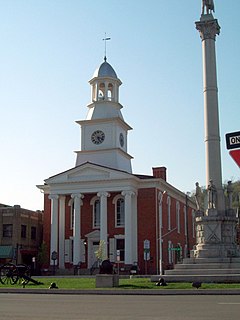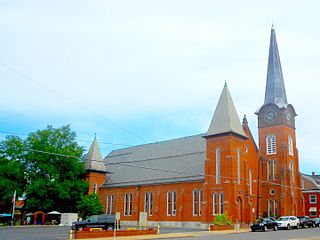
Huntingdon County is a county located in the center of the U.S. state of Pennsylvania. As of the 2010 census, the population was 45,913. Its county seat is Huntingdon. The county was created on September 20, 1787, mainly from the north part of Bedford County, plus an addition of territory on the east from Cumberland County.

Menno Township is a township in Mifflin County, Pennsylvania, United States. The population was 1,763 at the 2000 census. The township was named for Menno Simons, an early Mennonite leader. Mennonites and Amish were among the early settlers of the area, and members of these faiths continue to form a part of the area's population.

The Nebraska Amish, also called Old Schoolers, are a relatively small affiliation of the Amish. They are the most conservative subgroup of Amish, indicated not only by their use of technology but also by their peculiar style of dress. They emerged in 1881 as a conservative split from the Byler Amish who themselves emerged as the first conservative splinter group from the Amish mainstream in 1849.
Pennsylvania Dutch Country refers to an area of Southeastern and South Central Pennsylvania that by the American Revolution had a high percentage of Pennsylvania Dutch inhabitants. Religiously, there was a large portion of Lutherans. There were also German Reformed, Moravian, Amish, Mennonite, Schwarzenau Brethren and other German Christian sects. The term was used in the middle of the 20th century as a description of a region with a distinctive Pennsylvania Dutch culture, but in recent decades the composition of the population is changing and the phrase is used more now in a tourism context than any other.

Amish Mennonites came into existence through reform movements among North-American Amish mainly between 1862 and 1878. These Amish moved away from the old Amish traditions and drew near to the Mennonites to become Mennonites of Amish origin. Over the decades most Amish Mennonites groups removed the word "Amish" from the name of their congregations or merged with Mennonite groups.
John A. Hostetler was an American author, educator, and scholar of Amish and Hutterite societies. Some of his works are still in print.

South Central Pennsylvania is a region of the U.S. state of Pennsylvania that includes the fourteen counties of Adams, Cumberland, Dauphin, Franklin, Huntingdon, Juniata, Lancaster, Lebanon, Mifflin, Perry, Snyder, and York. Portions of western Schuylkill and southern Northumberland counties are also located in South Central Pennsylvania. Despite the designation "South Central Pennsylvania," many of the counties are geographically located in the southeastern portion of the state. By locals, it is commonly referred to as SoCePa. Lancaster, with a population of 59,322, is the largest city in the region, and the second largest metropolitan area. Harrisburg, with a population of 49,528, is the second largest city in the region, and has the largest metropolitan area with a population of 643,820 people, and is the capital of Pennsylvania. York is the other significant city in the region. The Harrisburg-Lancaster-York television market is the 39th largest market in the United States.
The Amish have been portrayed in many areas of popular culture.

Pennsylvania Route 305 is a 29-mile-long (47 km) state highway located in Huntingdon and Mifflin Counties in Pennsylvania. The western terminus is at US 22 in Alexandria. The eastern terminus is at PA 655 in Belleville. The route crosses the Stone Mountain ridge following a valley along a fault line at 40°37′46″N77°45′31″W near Greenwood Furnace State Park.

Conservative Mennonites include numerous groups that identify with the more conservative or traditional element among Mennonite or Anabaptist groups but who are not Old Order groups. The majority of Conservative Mennonite churches historically have an Amish and not a Mennonite background.
Subgroups of Amish developed over the years, as Amish churches have divided many times over doctrinal disputes. The 'Old Order' Amish, a conservative faction that withdrew from fellowship with the wider body of Amish in the 1860s, are those that have most emphasized traditional practices and beliefs. There are many different subgroups of Amish with most belonging, in ascending order of conservatism, to the Beachy Amish, New Order, Old Order, or Swartzentruber Amish groups.

The Byler Amish, also called Alt Gemee, are a small conservative subgroup of the Amish. They are known for the yellow color of their buggies, which earned them the nickname "yellow-toppers" and for wearing only one suspender. They are the oldest Old Order Amish affiliation that separated for doctrinal and not for geographical reasons.














